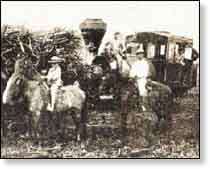LIHU’E – Perhaps it was the warm memories of growing up on Kaua’i that made Lyle M. Tabata stay even after receiving his furlough notice from Amfac’s Lihue Plantation. More likely, it was friendship’s ironclad bond. In 1982, when the
LIHU’E – Perhaps it was the warm memories of growing up on Kaua’i that made Lyle M. Tabata stay even after receiving his furlough notice from Amfac’s Lihue Plantation.
More likely, it was friendship’s ironclad bond.
In 1982, when the furlough was announced, Tabata, then a supervisor, was ready to depart for Maui, where a job was waiting with Hawaiian Commercial & Sugar, that island’s only operating sugar plantation.
But long-time friend Allan A. Smith, now a vice president of Grove Farm, talked him out of the move, convincing Tabata he had a brighter future at LP.
Smith was right.
Tabata has the distinction of being the last manager of LP, even after he vowed not to follow his father’s footsteps into the industry.
Smith was “doing what a leader does to keep a worker,” said Tabata. “He’s the reason why I’m still here.” Smith emphasized to Tabata the ‘ohana spirit of the island, how things are done here, and Tabata’s family ties to Amfac and the island.
“I loved growing up on Kaua’i, and wanted to come here to raise my family,” Tabata said. He and wife Vianne have three sons, Benson, Mikio and Michael, and live in Lihu’e.
Tabata followed in his father’s footsteps in other ways, too, gaining as Teruo Tabata did before him, a bachelor’s degree in mechanical engineering from Bradley University in Peoria, Ill.
Teruo Tabata, whose parents came from Japan in the early 1900s, enlisted in the 442nd infantry battalion during World War II. Following the war he used the GI Bill to pay for his college education. Coming to Kaua’i to accept a position at Hawaiian Canneries (the pineapple cannery where Pono Kai Resort is now located in Kapa’a), the elder Tabata later moved on to Amfac (shortened from American Factors) properties, Lihue Plantation and Kekaha Sugar Company.
While at LP, Teruo Tabata designed and supervised the construction of both the LP bagasse house, and the Lihue Shopping Center that now houses Big Save and many offices of county government.
The elder Tabata lives in Aiea on O’ahu with his wife Marilyn, a teacher who taught at schools in Kapa’a, Lihu’e and ‘Ele’ele. She was the first one in her family to attend college, her son said.
“Roots are deep in my family. I’m (a) third generation” sugar worker, Lyle Tabata said.
Lyle Tabata began his LP career at the Hanama’ulu shop, working under the late Larry Carvalho. When Tabata became a supervisor, two other long-time LP workers, Alvin Tanigawa and Dean Silva, were his “right-hand men.”
“There’s nothing that we could never fix,” he said of his shop crew.
When JMB, a Chicago real estate firm, bought Amfac, and merged the operations of LP and Kekaha Sugar into Amfac Sugar Kauai, Tabata accepted an offer to manage both the LP and Kekaha Sugar mill factories.
Later, he became manager of Amfac Sugar Kauai (both LP and Kekaha Sugar). To this day, friends from his school days still come up to him and remind him he was the only one of his classmates to reach such heights, he said.
Tabata points with pride to both Silva and Tanigawa, who have no college education but combined a “can-do attitude and rich work experience” to reach management positions at LP and accomplish tremendous things for the company, he said.
“I feel a special bond, too, because local boy,” said Tabata.
“The employees left (when the final component of LP shut down forever, that being the electric-producing power plant at the end of 2002) are the epitome of what I tried to instill in 1986,” a spirit of team management, with no boundaries, but lofty goals, he said.
“You don’t hear, ‘that’s not my job,'” he said. The rank-and-file employees and supervisors worked shoulder to shoulder, all with “their can-do and will-do attitude. They’ll be stronger upon leaving because of the skills they learned over the last two years,” Tabata continued.
“And they’ll all succeed.” Over the last two years, when the final harvest was done and just a skeleton crew accomplished what it used to take twice as many workers to do, the men learned, “the other guy’s job isn’t so scary,” Tabata said.
During his tenure as manager, “I got on people’s cases who needed,” and patted others on their backs when jobs were done well, he said.
“I hope I’ll be remembered (like his teacher mother) as strict, fair, a taskmaster,” someone who led with integrity, conviction and high morals. “Because it wasn’t only for me,” but also for those who came before him, he said.
At its peak, LP harvested some 82,586 tons of sugar, in 1985, averaging over 2,000 tons of sugar a week during the 40-week harvesting season.
Tabata, 46, remains under contract with Amfac this month, finishing up some final reports. After that, he has several potential new jobs in mind, he said.
A few years ago, he began taking classes at Kaua’i Community College to attain a master’s degree in business administration, hoping to add some new tools and techniques to be more effective in his plantation job. Last year, he received the degree.
During the course of the interview, while moving out of his office near the LP power plant and electric shop, he answered a telephone call where someone on the other end asked him about the plantation’s final days.
“Yeah, we done,” he said.
Staff Writer Paul C. Curtis can be reached at mailto:pcurtis@pulitzer.net or 245-3681 (ext. 224).


